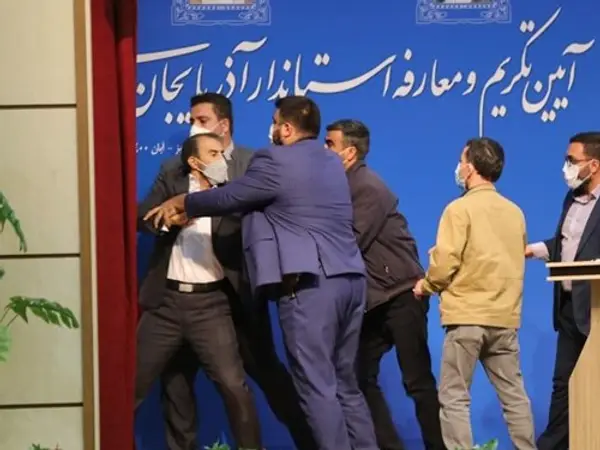Iranian state TV's clip of one military officer slapping another during a public ceremony led to a deluge of speculation, theorizing, cheers, and condemnation.
On Saturday [Oct. 23], while Brigadier General Abedin Khorram, dressed in civilian clothes, was beginning his inauguration speech in Tabriz, IRGC colonel Alizadeh (no first name has been published), also in civilian clothes, approached him on the podium and calmly slapped him hard in the face. A half-dozen people rushed to the stage, and he was ushered out of the hall by security guards.
In an odd occurrence, the state television's news channel IRINN, not only carried the footage of the attack but also posted it on its Telegram channel so that more people could watch or share it on social media.
IRGC-linked Tasnim news agency immediately carried a story to justify what had happened by allegedly fabricating a story that said Alizadeh attacked the governor after he found out that his wife was vaccinated by a member of the opposite sex. The Iranian social media did not believe this story.
On Monday, reformist daily Arman condemned the incident as "how bad the appointment of security and military commanders as civilian officials can turn out to be." During the past weeks, many have criticized Interior Minister (IRGC general) Ahmad Vahidi for appointing all of the provincial governors from among IRGC commanders.
A senior reporter Masoud Noori who has worked with many news outlets including the official news agency IRNA, wrote in an October 23 tweet, "So far, at least 22 senior officials including cabinet ministers and governors have been chosen from among current or former IRGC commanders. Government posts have been given to military officials in all previous governments too. But what is taking place in the current administration is unprecedented. It is no longer clear who runs this administration, President Ebrahim Raisi or the IRGC?"
Minister Vahidi reacted on Twitter in a way to save face for the governor and the IRGC. He wrote: "An official in the sacred regime of Islamic Republic does not fear insults or a slap in the face as he is serving the people to satisfy God almighty." Hundreds of users dismissed his comment.
Meanwhile, praising the governor, Ahmad Alirezabeigi, an MP for Tabriz told reporters that Khorram was such a good officer that when ISIS took him hostage in Syria, former President Mahmoud Ahmadinejad paid a hefty ransom of $57 million to secure his freedom. In fact, some say it was the Emir of Qatar who paid the ransom to free 57 hostages, including Khorram, for one million dollars per person.
Cleric Mohammad Ali Abtahi, the chief of staff of former reformist president Mohammad Khatami, wrote: "They say they appoint military figures as governor to control tension in the provinces. But they failed to control the tension at the governor’s inauguration ceremony."
Ehsan Mazandarani, a journalist, wrote: "What is more important than a slap in the face of a governor…, is the fact that it made many people happy. What do citizens think of a manager that a slap in their face makes so many happy?"
Another journalist, Elham Naddaf, wrote: "He slapped the governor general in the face and everyone said, 'Well Done!' before even knowing why he attacked the official."
Arman wrote that the country's elite had warned Raisi to avoid appointing military personnel to civilian posts and he promised that his appointments will be free from political and other influences, but his Interior Minister appoints the governor with security paramount in his mind.
Iran analysts abroad, including Morad Vaisi have told Iran International TV that the government appoints IRGC commanders as governor because officials fear the repetition of massive protests as a result of economic hardships, similar to unrest in 2018 and 2019.
In Aftab Yazd daily, an MP for Maragheh, Ali Alizadeh said the two protagonists in the slapping story had some personal grudge against each other. Others said that Khorram had prevented the attacker's promotion within the ranks of the IRGC. Meanwhile, sociologists speaking to Aftab Yazd, said the people's reaction was more important than the incident, and “it shows their anger and distrust toward state officials.”
